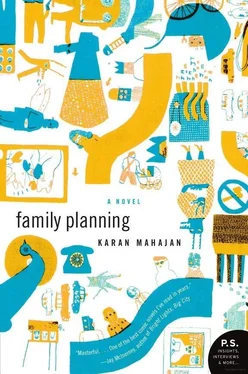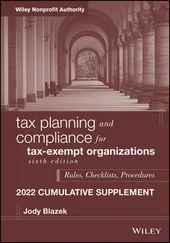(He was in a bad mood because he’d argued with his parents.)
She said, You’ve done it again.
He said, I’m sorry.
You can’t just say sorry and think it’s over.
I’m so sorry, he said.
The driver heard their argument and laughed. This made Rakesh doubly mad. He said, Let me drive.
Rashmi said, You don’t have an Indian license.
Soon Rashmi and Rakesh were sitting in the front. Rakesh was hunched over the steering wheel.
Rashmi said, We Indians believe in fate. Look at these people driving like maniacs. We Indians. Believe in. Fate.
Rakesh said, What fate.
Look at this cow you’re about to hit.
Cows believe in fate.
He hit the cow.
Now Rakesh had damaged his Masi’s brand-new Contessa (a big cow-shaped dent had formed on its bonnet) and had to bribe the driver.
The driver said, Sir, money you will give me, but what about my job?
We’ll say it wasn’t your fault, Rashmi said in her sweetest voice.
They sat shamefaced in front of Rakesh’s Masi. Already their family relations were strained — Rakesh’s mother and Masi were involved in a property dispute — and now Rakesh was going to admit that he’d wrecked her car.
Rashmi said, I did it.
What happened, beta? asked the Masi.
Because I was driving like an American, she said.
Then she gave Rakesh the most short-lived piercing glare possible. She knew how to handle him. She’d won by suddenly making a sacrifice. She was so stunning — with her erect posture and the teasing lilt of her voice, and her hands that sprayed out every which way as she talked — that even his terrifying auntie was charmed. Rakesh, too, could never say anything to Rashmi on the subject of Indian-style driving ever again, and long afterward, in Vermont, he couldn’t explain to himself why every mistake a driver made in America felt for him like a minor (guilty) victory; why on the day John the neighbor reversed into their mailbox, he mowed the lawn three times; why when the morning news came in of a nonfatal pileup on the highway, he was strangely ecstatic and cooked rajma like he was a master chef; why on the day Rashmi died, he was aware that if he and Rashmi had been mere spectators of the accident — if it hadn’t, in other words, been the day she died — he’d have thrust his hands under the waterfall of her hair, cradled her neck in the confluence of his fingers, and finally told her why he was so happy: she was alive and he had won the argument she’d set into motion on the cow-killing Delhi day two years before. He’d proved that Americans were as prone to bad driving as Indians, that the only difference was that America had police officers and bureaucrats that enforced rules, and Indians had officers with titles like District Magistrate of Jats, Joint Secretary for Tribal Welfare Scheme Attached to the Ministry of Welfare, Inspector of Mining, Collector for the Sub District Falling Between Chhatisgarh and Madhya Pradesh, Director Sub) of Special Preservation of Languages whose job was to simply figure out the purpose of these titles.
But he would never have said this. Someone had been run over by a motorcycle and a door was flying. But even if he had said this, who would he have said it to? There was no one to argue with ever again. No one to crumple into at a moment’s notice.
Only people to blame.
So when Rakesh returned to India and found himself once again in the country’s royal mess, he blamed everything on the administrative service, the police force, the babus, that bureaucratic mess that had rejected him and made him flee to the US; that made him fill out ten pages of paperwork in order to transfer Rashmi’s ashes to India; that lost the papers; that fined him ten thousand rupees at customs for his “imported Tourister Funeral Urn.” And that finally extracted three bribes from him at the airport — bribes Rakesh paid because he didn’t want to be late for his wife’s fourth-day rites and because he was rich, because he could. You could smell it on him — his American cologne.
But he could also turn his riches against these tormentors: he vowed to track down the two customs officials who’d given him hell, to use every connection at his disposal to end their careers, and that was how he found himself at the doorstep of Rupa Bhalla, a family friend who was a Member of Parliament and the president of the SZP Party. She too was recently widowed: her husband, Ashok Bhalla, a former Prime Minister, had been sown into a field by a terrorist driving an advanced harvester during the spring festival in Punjab.
She and Rakesh talked for a while and she was impressed by his political views and intelligence and his firsthand anti-Americanism. As Rakesh told her the story about the customs officials, she hobbled about madly in front of the rectangular painting that spanned the entire wall of her drawing room. Over time, with smoke and moisture, the painting had blurred into a constant saffron horizon for the befuddled visitor, its human figures — highly impressionistic to begin with — looking more and more like a series of rotten cauliflowers planted in a desert. The painting was horrible, vomit-inducing, and she said she’d painted it herself.
She was standing in front of the painting, and as Rakesh looked, it seemed as if Rupa Bhalla’s face was sprouting a hundred nodes on either side, a gallery of self-portraits that were only a little more hideous than the woman before him. He thought then, with a gasp of terror: here was a mannequin of lost sexuality and beauty. You could tell she had been something in her youth; he had seen pictures of her next to her late husband — vivacious, head-up, kissable — the sort of girl who, if she had been from Delhi or Bombay, not Haryana, might have smoked ahead of her time. Who might have walked into a hall of men with brash elegance, bangles clinking a bit too much, a splash of cognac perfuming her bare navel. Who made awful paintings. But she carried her loss of energy like a lesson learned, and now the young Rakesh realized that losing sexuality was to finally be forced into a sort of asceticism, to transcend the pettiness of life, a politician who was driven by nothing but a will to remain alive, then to die in public view. To be seen by all — and had by no one. This idea seemed unbearably romantic to him. He still thought he would never remarry. He wanted badly to become a politician as well.
That was when Rupa Bhalla said that she knew the painting was horrible.
Rakesh had said, No, no, it wasn’t.
She laughed and said, It’s okay. Just listen.
He said it wasn’t horrible at all.
She said, You’ve passed the test. This is my test. Any new party member who is honest with me, I immediately dismiss, anyone who keeps flattering no matter what — them I keep.
You want me in the party? Rakesh said.
Of course, Rupa said. That is the only way I can help you.
And that was fourteen years ago, Rakesh mused, arriving at the office. Fourteen years of being in and out of power, of having made sure those two customs officials had been posted in a caste violence-ridden sector of Bihar. And still his ambition was unchanged. His entire drive in becoming a minister — when he wasn’t making anti-American speeches and protesting against multinationals — was to sit atop the vast, damaged machinery of the Indian civil service and use his powers to hammer their cogs back into their service roles. It was as if he’d touched down in Indira Gandhi Airport all those years before and in passing through the X-ray mutated from a Master of Civil Engineering to a Master of Mass Feeling.
And now, when he’d finally achieved that dream by overseeing every single detail of the bloody Flyover Fast-Track he was being accused of not being enough of a politician?
Читать дальше












